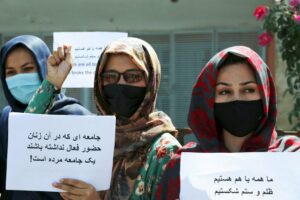“We decided to protest to demand our basic rights: the right to education, to work, and political participation. We want the Taliban to know that they cannot eliminate us from society.”
Those were the words of Arezo, a young woman from Kabul who took to the streets after the Taliban’s announcement that women would not be allowed to hold senior positions in Afghanistan’s new government.
“The Taliban have told women that they have no place in the new order,” another protester said. “We told them that we want to continue working, but they say only female nurses and teachers are allowed to work. We are engineers and lawyers and we want to work in our professions, but they say we cannot and should stay at home instead.”
Protests by Afghan women against Taliban restrictions that began in Herat on September 2 have spread to Kabul and Mazar-e-Sharif. On September 4, around 100 women gathered in front of the presidential palace – now the Taliban’s command center in Kabul – carrying banners and chanting slogans for an equal society.
Taliban security forces reacted violently to these protests. In Kabul they stopped the women and beat at least 10 of them. Nargis was among those beaten. She told me: “When I saw that they are badly beating one of the participants, I went to help but the Taliban soldier hit me with a metal object, and I fainted. All I remember is that there were two other women on the ground, and they were still being beaten.” Taliban officials said they detained four of their men who beat the protesters.
Taliban authorities are obligated under international human rights law to respect and uphold the right of everyone to peacefully protest. Concerned governments should press the Taliban to protect freedom of expression and peaceful assembly.
As governments assess their relationship with the Taliban in the weeks ahead, it will be critical for the Taliban to demonstrate they are willing to accommodate diverse communities, tolerate dissent, and meet the demands of women and girls for their fundamental rights – including the right to work and to participate fully in political life, including in public office.



